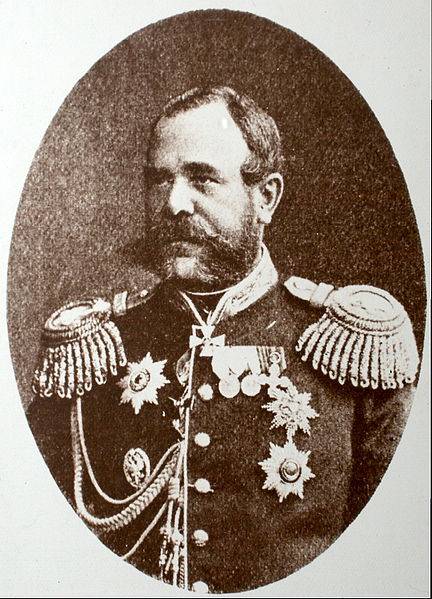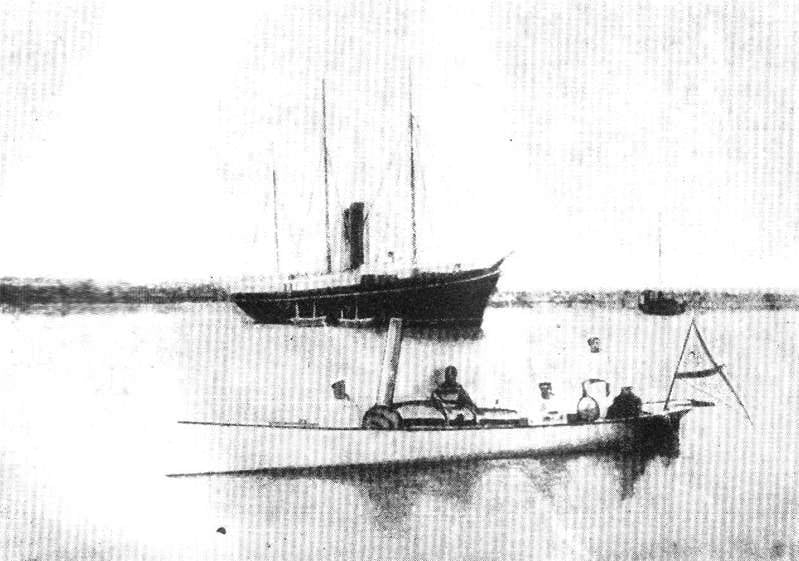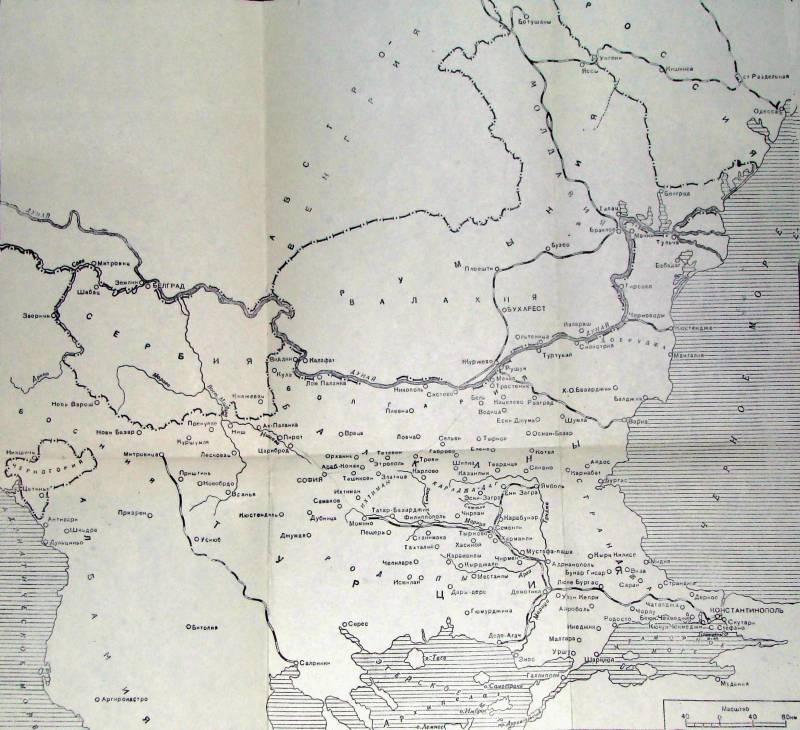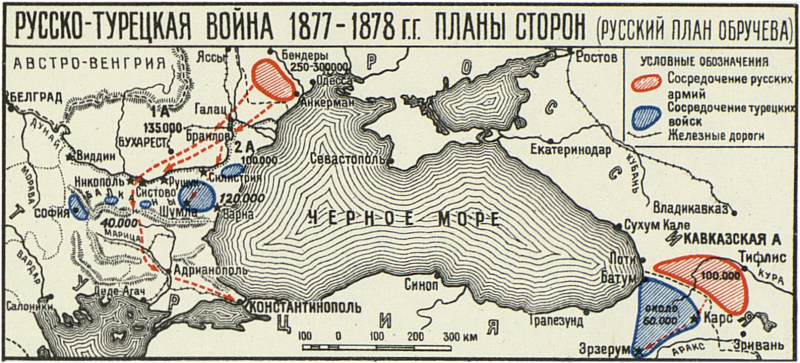“Only on the shores of the Bosporus can the Turkish rule be really broken ...” Plan of a lightning war of N. N. Obruchev
The Danube River was the first major natural obstacle in the direction of the actions of the Russian army. The high and steep right bank was convenient for defense and unprofitable for landing troops. The low left bank abounded in many lakes, swamps and was covered with reeds, which made access to the riverbed difficult. The spring flood began in early April and ended in mid-June, but sometimes the flood was delayed until the end of June (this happened in the 1877 year). Forcing a large European river during a powerful spill, when its width reached 10 km and depth to 30 m, was a very difficult task, complicated by the presence of Turkish fortresses built in the XVIII century, but constantly improved. The most powerful fortresses were Ruschuk, Silistra, Varna, Shumla. The first two fortresses, located on the right bank of the Danube, directly provided for the defense of the Danube border. Four fortresses blocked the shortest route through Eastern Bulgaria to Constantinople and from the flank threatened the communications that led to Central Bulgaria. To the west of these four fortresses, on the Middle Danube, was located the strong fortress of Vidin, and the weaker, outdated strongholds — Nikopol and Turtukai.
The Balkan Mountains were the second natural barrier on the way of the Russian army. They were divided into three parts: western, middle and eastern. For the entire ridge, with the exception of the western part, the sloping and wooded northern slopes and steep, almost treeless southern ones were characteristic. In the western and middle parts of the mountain are high, with peaks over 2000 m. To the east, they fall to 500 m and near the Black Sea end with 60 m precipice. Through the ridge passes a number of pass. The main ones are Berkovetsky, Orkhaniy (Arab-Konaksky), Trojan, Shipka, Travzhensky, Hinkoi, Tvarditsky and Slivnensky. All the roads through the passes went out onto the common road: Sofia, Kazanlak, Slivno, Burgas. This greatly facilitated the defense of the Turkish army, as it made it possible to quickly concentrate troops at any pass, to maneuver forces and reserves. True, there were also many pack roads and paths through the mountains, but large forces could not be transferred over them or it was extremely difficult. If in the summer the Balkan Mountains were overcome in any direction, in the winter the possibilities of movement in the mountains were extremely limited.
The Caucasian theater was a mountainous area, still inaccessible, without good roads needed to supply the troops, so the ability to deploy large operations here was limited.
Therefore, when planning a war, the Russian command, as in previous wars, considered the Balkan theater to be the main one. On the Balkan Peninsula, there were relatively passable communications, the shortest paths were on the way to the Turkish capital, Constantinople (Istanbul) and the straits. At the same time, the local Christian and Slavic population - Romanians, Bulgarians, Serbs, Montenegrins and other nationalities, were friendly to the Russians, looked at them as liberators, for the most part hated the Ottomans. Local people could also provide armed assistance (intelligence, militia, etc.). The Balkan theater was connected by railways with Russia; a significant army could be transferred here. The Caucasian theater had no such advantages. Thus, the Russian command decided to focus on the Balkan theater, the Caucasian front received auxiliary significance.
Theater of Operations in the Balkan Peninsula. Map source: N. I. Belyaev. Russian-Turkish war 1877 — 1878
Russian war plan
In March 1876, Colonel N.D. Artamonov, an employee of the military scientific committee of the General Staff, gave a series of lectures for officers of the Petersburg Military District, united by a common theme - “On the Strategic Advantageous Method of Action Against the Turks”. It was noted that in open battles the Russians always beat the Ottomans, but often failed when they got involved in long sieges of Turkish fortresses, being distracted from primary tasks to secondary ones. Therefore, a swift operation with a decisive goal is needed. The main goal was the capture of Constantinople, as the most important strategic point of the Turkish Empire. The struggle for fortresses, as a factor linking the Russian army, was ruled out. It was noted that the strike army should quickly compensate for the losses by marching replenishment; Do not spend troops on rear services; the army should not be large so that there are no problems with its supply, but not small, so that it can fulfill its tasks. Much attention was paid to forcing the Danube. In particular, it was supposed to bring the forest in advance, prepare the appropriate materials, deliver 24-pound (152 mm) guns to paralyze the actions of the Turkish Danube flotilla, provide protection for crossing minefields.
There is an opinion that these lectures were given on instructions from General Nikolai Nikolayevich Obruchev, who was in charge of the military-scientific department, which played the role of an operational cell in the General Staff building. It is also possible that Artamonov was the frontman of Milyutin and Obruchev, who set forth their considerations under the guise of their conclusions from the study of Turkey and its troops. The hoop in this way checked the correctness of their calculations regarding the plan of war. In May, 1876, the material of the lectures was arranged in the form of a special note, and in October, Obruchev owed to Tsar Alexander II.
Nikolai Obruchev played a big role in convincing Alexander II of the need for war with Turkey. In the fall of 1876, the Ottoman Empire was in an extremely difficult position. The Turkish army (its most efficient troops) was linked with the struggle against the insurgent Bosnia and Herzegovina, the war with Serbia and Montenegro. The fight was difficult, stocks weapons and the ammunition ran dry, and new ones could arrive from abroad only in the spring of 1877. The port has not yet mobilized. This and proposed to use Obruchev. He believed that after partial mobilization, it was possible to begin a decisive offensive by a small army. With a lightning advance, it was possible to force the Danube, the Balkan Mountains on the move and take Constantinople (or create a threat of its capture), without stopping to capture the Turkish fortresses. At the same time, the response factor of the Western powers was excluded, they simply did not have time to help Porte. The goal of the war was to liberate Bulgaria, it was believed that this could be achieved only by the occupation of Northern Bulgaria.
Plan Obrucheva well worked the question of forcing the Danube. “The crossing over the Danube,” Obruchev wrote, “was considered to be the most advantageous to carry out at Zimnitsa-Sistovo (or in the vicinity), since this point is most inward into Bulgaria, allows you to bypass the fortresses and provides enough routes for the maneuver from the Romanian side. Above this, a demonstrative crossing at Galats-Brailov was suggested, perhaps also a flying squad in the vicinity of Vidin. The ferrying method was proposed maneuverable with the help of pontoons, since only the advantage of tactical training, technical means and the speed of movement of the Russian troops could promise the success of this crucial operation. The fencing of the ferries should have been achieved by the installation of minefields and strong batteries. ”
The immediate tasks after the crossing of the Danube were the seizure of passages in the Balkans and the acquisition of Rushchuk. The seizure of passages in the Balkan Mountains was to be carried out as soon as possible after the crossing: by the forces of 1-2, cavalry divisions, the Caucasian Cossack division and several Don Cossack regiments supported by rifle battalions and part of the 8 corps. The seizure of mountain passages made it possible to: transfer part of the cavalry to the valley of the Maritsa River through the Balkans and interrupt communications with the rear of those units of the Turkish forces that were located against Serbia; on the occupied territory to form the militia of the Bulgarian militia; prepare the road for the movement of the main forces of the army. The seizure of Ruschuk was of paramount importance, since it enabled the army to secure communications through the Danube from the left flank, from Silistra and Shumly. After that, a decisive offensive could be launched.
Plan Obrucheva discussed and accepted. In a situation of poor readiness of Turkey for war with a serious opponent, the transfer of partially mobilized and concentrated Russian troops to a decisive offensive (Suvorov-style) promised a sure victory. However, Petersburg, although it carried out a partial mobilization, did not dare to start a blitzkrieg. The Russian government was still hoping for a peaceful settlement of the Eastern crisis and was afraid of a strong negative reaction from the Western powers. The complete failure of the Constantinople Conference of the Year 1876 and the London Conference of the Year 1877 showed the impossibility of resolving the issue through diplomacy. Even under the threat of war, Istanbul persisted. Port was hoping for support from the West (in particular, Great Britain), and behaved defiantly in a defiant manner. The Ottomans, with the help of England, were vigorously preparing for war. Turkey received modern weapons, large stocks of ammunition, strengthened the army. This forced the Russian government to conduct a second partial mobilization in the spring of 1877.
Thus, in the winter of 1876-1877, in the early spring of 1877, the military situation in the Balkans has already changed in favor of Turkey. In winter, the Port considerably strengthened its troops, pulled together everything that was possible on the Danube Theater, increased the Danube flotilla, strengthened the fortresses, supplemented their armament. Serbia was out of action, its army was defeated. England occupied a hostile position; one could expect a military intervention on its side from Turkey.

Nikolay Nikolaevich Obruchev (1830-1904)
The new situation required some changes to the original plan of the war with the Turkish Empire. This was done by N. N. Obruchev in his “Considerations in the event of a war with Turkey in the spring of 1877” from 10 (22) of April 1877. Obruchev defined the political goal of the war as “a complete irrevocable solution to the Eastern Question — as the absolute destruction of Turkish rule on the Balkan Peninsula. " “The very strength of events indicates,” the General wrote, “that we must, finally, once and for all deal with this ghost, which periodically depletes Russia and serves as one of the main obstacles to the development of its welfare.”
A strategic goal was set: “... in order to achieve decisive results, the goal of our strategic actions, more than ever, must be Constantinople itself. Only on the shores of the Bosphorus can you really break the rule of the Turks and get a lasting peace., once and for all our dispute with them over Balkan Christians. Occupation only Bulgaria does not give these results. As long as the Turks own the Constantinople peninsula and dominate the Black Sea, they will never recognize themselves as defeated. The mastery in the military sense of Constantinople and the Bosphorus is thus an absolute necessity. We can stop in front of it only if Port and Europe give us the world exactly the same as if we were already in Constantinople itself. ” At the same time, General Obruchev later noted (in the 1880 note of the year) that Russia "would never take Constantinople politically, never take it for itself".
Obruchev still believed that a quick and decisive campaign was the best remedy for all difficulties. Obruchev wrote: “With decisiveness and speed of action, the taking of Constantinople does not seem absurd, but, on the contrary, it is very likely.” According to Obruchev’s plan, it was planned to deploy 7 buildings in the Balkan theater, reducing them to two armies. One of them, with a force approximately in the 3 corps, had to move to the Balkan Mountains after crossing the Danube and, advancing as fast as possible, reach Constantinople in 4-5 weeks. This decided the outcome of the war, Porte would have to capitulate. The second army, a force in the 4 corps, at this time was to consolidate on the Danube and secure the rear of the first army, leading the attack on Constantinople. At the second stage of the war, the second army, having solved the first tasks, could be advanced to eliminate the remaining enemy forces in northern Bulgaria, or beyond the Balkan Mountains to help the first army. Obruchev’s idea of the formation of two armies in the Balkan front — the shock (invasion) and the support (rear) —was very successful. Two tasks and two objects required two separate groups of troops.
Of the three possible operational directions for the offensive (coastal, central and western), the central was considered the most convenient, since it gave the greatest number of military and political benefits. In particular, in the coastal direction of the Russian army could threaten a stronger Turkish fleet. And the western direction was unacceptable because of the secret agreement with Austria-Hungary.
When calculating the forces and assets, Obruchev proceeded from the number of Turkish troops in the Balkans to 160 thousand people and their possible reinforcement by various foot and equestrian militias, troops from Egypt and the British 50-60 thousand expeditionary force through 8-14 weeks after the start of the war . He believed that the 1-I Russian army, intended to rush to Constantinople, should have about 130-135 thousand bayonets and sabers, and the 2-I army, intended for operations in Bulgaria - 100 thousand people (with bringing its number to 160 thousand people). Only the 10 battalions remained in reserve. The total number of Russian troops slated for deployment on the Balkan front was to be 250-300 thousand.
Thus, the war was considered only as offensive; the nature of the actions of the army was assumed to be decisive, in the swiftness and speed of actions they saw a pledge to overcome various difficulties. The goal of the campaign is Constantinople (this led to the capitulation of Porta) and the liberation of Bulgaria. In general, Turkey was planned to crush with one powerful and swift blow. The problem was that in the course of the campaign, the considerations and plans of Artamonov and Obruchev underwent serious changes immediately after the crossing of the Danube, and as a result, little was left of them.
It is worth noting that in Russia they underestimated the strength of the Turkish army. Information about the enemy drew from random, unverified sources (in particular, foreign newspapers). And the reports of the agents represented the enemy army in a completely disorganized war with Serbia and Montenegro, alongside uprisings. However, in reality, the Turks quickly recovered, including with the help of the Western powers. The British wanted to tie up Russia in a long, bloody war in order to get maximum political benefits. As a result, the Ottoman army in the Balkans in Russia underestimated.
Caucasus
The fighting in the Caucasus was supposed to divert the enemy to this direction and protect our borders. War Minister Milutin 5 (17) of October 1876 wrote to the commander of the Caucasian army: “Major military operations are expected in European Turkey; on the part of Asian Turkey, our actions should be aimed at: 1) covering the safety of our own limits with attacks - for which it would seem necessary to capture Batum and Kars (or Erzerum) ... and 2) if possible, divert Turkish forces and resources from the European theater and prevent them organizations - for which, after mastering a part of Armenia, more or less long-term searches should be undertaken by volatile detachments. ”
In addition, the victories of the Russian arms in the Caucasus against Turkey were supposed to raise the prestige of Russia among the peoples of the North Caucasus, who had just become part of the empire. Petersburg also planned to get some territorial increments at the expense of Turkey. All this could be achieved only by a successful offensive.
A Caucasian army of about 100 thousand people with 276 guns was intended for operations in the Caucasian theater. In accordance with the peculiarities of the theater of operations, the troops of the Caucasian army were distributed among several units. The largest of them were the acting corps, designed to operate in the main part of the theater, and the Kobuleti detachment, aimed at Batum. Russian troops opposed about 90 thousand Turks. Without having information about the size and composition of the Turkish army in the Caucasian theater (the Turks had few priority units here), exaggerating the number of the enemy by half, the Russian command in the Caucasus refused a decisive offensive on the Erzurum direction, missing the moment, until the enemy strengthened the Caucasian direction. After the declaration of war, they planned to cross the border and take near to it, in the 1-2 transitions, such positions from which it would be possible to cover Russian territories from the invasion of the Turkish army and conduct reconnaissance. Depending on the results of intelligence, they were going to: continue the offensive or go on to active defense.
Fleet
The military situation on the Black Sea at the beginning of the war was very unprofitable for Russia. Because of its weakness, the Russian Black Sea Navy was not in a position to wage a direct struggle against the Ottoman navy, which was restored with the help of France and England. He also could not get support from other Russian naval forces (in particular, from the most powerful Baltic fleet), since the straits were in the hands of the Turks. In addition, the Russian squadron cruising in the Mediterranean under pressure from England was withdrawn to the Baltic. As a result, the possibility of diverting part of the Turkish fleet to the Russian squadron in the Mediterranean Sea was excluded. The port could concentrate the entire fleet in the Black Sea.
As a result, the Black Sea Fleet was tasked with defending the coast and ensuring the crossing of the Danube. The Russian naval command planned, by setting up minefields at the mouth of the Danube, to prevent the passage of enemy ships into the river from the Black Sea. It was also planned with the help of mines to isolate from each other individual detachments of the Turkish Danube Flotilla based at the fortresses, and then destroy the Turkish ships with the help of attacks from mine-boats. For the immediate protection of crossings on the Danube, as well as coastal batteries, additional minefields were to be installed.
The fight on the sea lanes was planned to be carried out with the help of auxiliary cruisers equipped with their usual steamers. S. O. Makarov, still a young officer then, put forward a brilliant idea to use for attacking enemy armadillos mineboats transported aboard a steamer. The usefulness of this idea consisted in the combination of the properties of a steamboat and a mine boat. The steamer was relatively fast and had a long range, he could not attack the armadillos, but could quickly get close to enemy naval bases and, if necessary, get away from the slow-moving enemy. The mine boat could attack armored ships, but was slow-moving and had a small radius of action. The combination of a steamer (auxiliary cruiser) with a mine boat gave all the benefits of speed, impact force and range of action.
Thus, despite the immense superiority of the Turkish fleet on the Black Sea and on the Danube, which had 1-2 armored ships of ranks, the Russian fleet, which had well-trained crews, could carry out the tasks assigned to it.

The steamer "Grand Duke Constantine" and its destroyer "Chesma"
Results
Thus, the Russian command has developed a bold plan. The plan envisaged a decisive concentration of forces and means in the direction of the main attack, which ensured the achievement of the goals of the war during one short-term campaign. The Russian army was to move quickly and decisively to Constantinople, preventing the enemy from tying up Russian forces with a viscous siege of fortresses and battles on natural frontiers - the Danube and the Balkan Mountains. As a result, Porte would have to capitulate without being able to protect the capital. Also, such an operation did not allow the Western powers to prevent Russia (Britain was particularly dangerous, which could send the fleet and the landing corps to the straits area). However, as subsequent events showed, the Russian high command made a number of mistakes and failed to fully implement a bold idea. In particular, a convenient time was missed for the start of the war, when Russia had already carried out partial mobilization, and Turkey was not ready for war, and had not yet managed to restore combat effectiveness after the war with Serbia and Montenegro, the uprisings in Bosnia and Herzegovina, did not mobilize, did not replenished ammunition.
Additionally, The Russian command overestimated the "weakness" of the Turkish army, hoping to achieve the desired result without the mobilization and efforts of all the armed forces of Russia. So, Obruchev estimated the Turkish troops in the Balkan theater at about 160 thousand people. But other sources (maritime ministry, foreigners) talked about 230-270 thousand Ottoman soldiers. That is, to create a double superiority for a successful offensive and simply sweep away the enemy, it was necessary to expose not about 300 thousand people, as Obruchev believed, and 450-570 thousand people. Moreover, the planned number of Russian troops by Obruchev for additional mobilization was cut down and limited to 235 thousand people. The government feared complications in Western Europe, which forced to keep troops on the border with Germany and Austria-Hungary, and also wanted to save on the war. As a result, the Russian army in the Balkan front had to fulfill a decisive strategic goal, having no superiority in forces over the Turkish troops. And the Turks could still strengthen the army in this theater by reinforcements from other regions of European Turkey, from Anatolia and Egypt, through mobilization and the creation of new formations. As a result, the war dragged on, demanded significant efforts and sacrifices and did not lead to the full implementation of the military-political tasks that faced Russia.


Information